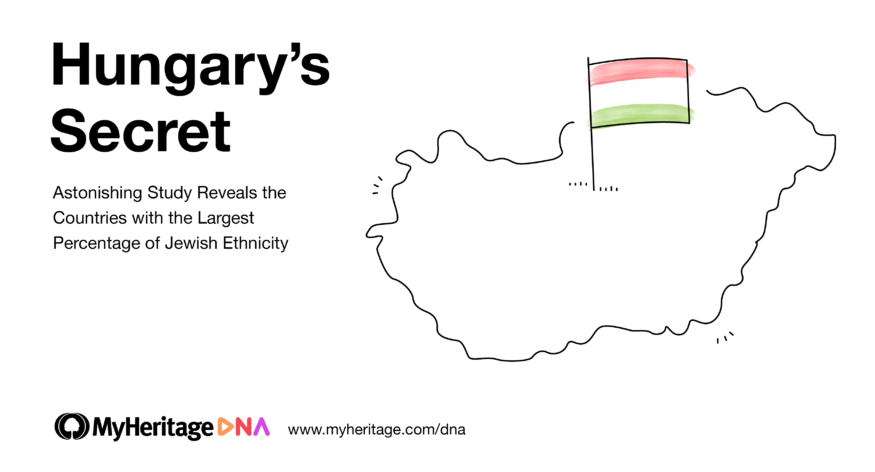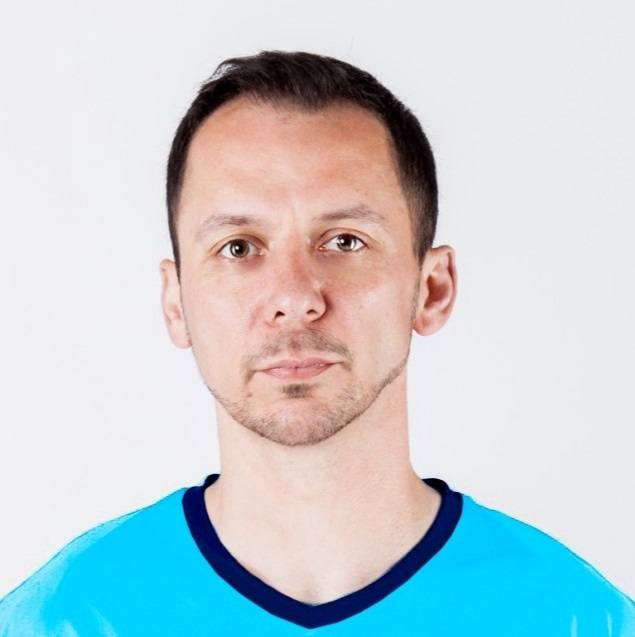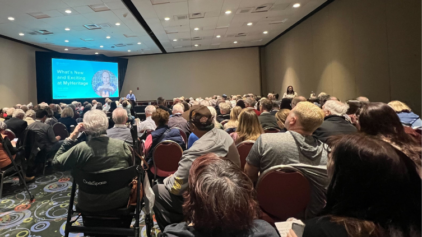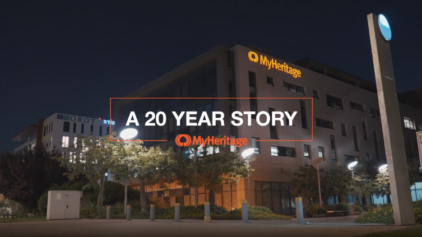I am 82 and was totally shocked to find out I was 52% Ashkenazi Jewish. All my life I was told my Dad was 100% Hungarian.
Hungary’s Secret: New Study by MyHeritage Reveals that Hungary Has the World’s Second Largest Percentage of Population with Jewish Ancestry
- By Esther


A new study that we’ve conducted in conjunction with expert statistician and demographer Dr. Daniel Staetsky has uncovered that there are surprising numbers of people descended from Jewish ancestors in Hungary — far higher than previously estimated by demographers.
Our analysis of a huge cohort of 1.8 million anonymized DNA tests — the first of its kind in Jewish demography research — has revealed that the country with the highest proportion of Ashkenazi Jewish ethnicity after Israel is Hungary, and not the United States as was previously believed. After Israel, the top countries in terms of significant Ashkenazi Jewish ethnicity were Hungary and Russia, followed by Argentina, South Africa, Ukraine, and then the USA. This shows that there is a significant number of people in Hungary who have a Jewish heritage background that they do not acknowledge, are not aware of, or that their ancestors intentionally repressed.
The Research
MyHeritage collaborated with Dr. Daniel Staetsky, Director of the European Jewish Demography Unit at the Institute for Jewish Policy Research, who conceived the study.
Previously, many demographers believed that the countries outside of Israel with the highest proportion of Jewish inhabitants among the total population are, respectively, the USA, Canada, France, Hungary, and Uruguay. In order to test these assumptions, we analyzed a huge dataset of anonymized DNA tests taken by 1.8 million MyHeritage customers worldwide, focusing on Ashkenazi Jewish ethnicity. The data used in the research was a subset of the wider global MyHeritage database; for increased accuracy, only DNA test-takers whose country of residence could be confirmed were included. For example, if an individual living in a certain country purchased additional DNA kits for family members whose country of residence was not known to MyHeritage with certainty, they were excluded from the study.
Among the 100 countries included in the research, the country that stood out with the highest percentage of Ashkenazi Jewish ethnicity outside of Israel was Hungary. 7.6% of the 4,981 people living in Hungary who took the MyHeritage DNA test were found to have 25% or more Ashkenazi Jewish ethnicity (equivalent to having at least one grandparent who is fully Ashkenazi Jewish). This is a significantly higher percentage than the 3.5% observed in DNA test-takers living in the USA and the 3.0% in Canada.
Hungary’s lead grows further at lower thresholds for Ashkenazi Jewish ethnicity. 12.5% of the people tested in Hungary have 10% or more Ashkenazi Jewish ethnicity, compared to only 4.7% of people in the USA and 4.0% in Canada. Meanwhile, 4.2% of people tested in Hungary have 50% or more Ashkenazi Jewish ethnicity (equivalent to having at least one parent who is fully Jewish), compared to 2.3% in the USA.
The current population of Hungary is approximately 9.7 million, based on the latest United Nations estimates. MyHeritage’s discovery that 4.2% of DNA test-takers in Hungary have 50% or more Ashkenazi Jewish ethnicity, requires an adjustment to translate this percentage to population numbers. Dr. Staetsky suggests accounting for a degree of selectivity of MyHeritage users. Since commercial genetic testing is an activity where the most educated and well-to-do classes of a society will be over-represented, he accounted for such selectivity, estimating the number of people with 50% or more Ashkenazi Jewish ethnicity in Hungary as 130,000.
This is significantly higher than some recent estimates. Official statistics set the number of Jews in Hungary at only 10,965, according to the 2013 national census. Alternative estimates, such as the estimate produced by Professor Sergio DellaPergola, show that the number of people in Hungary who self-identify as Jews — for example, when asked in a survey — comes to 47,500 people or 0.49% of the population.
Larger estimates of the population with Jewish ancestry in Hungary, produced by Professor Andras Kovacs, give a range of 73,000 to 138,000 people with at least one Jewish parent. Thus, the estimate based on MyHeritage data aligns well with the high end of some demographic estimates, lending credibility to both the traditional demographic methods and to the novel estimates based on genetic testing.
Historical Context
Ashkenazi Jews throughout the past centuries have lived in isolated communities that developed unique genetic signatures. This means that autosomal DNA tests, such as the MyHeritage DNA test, are capable of detecting Ashkenazi Jewish ethnicity with high precision. While DNA tests cannot determine a person’s current or previous religion, they can detect Ashkenazi Jewish ethnicity, indicating that the person’s ancestors had been Ashkenazi Jewish. Previous studies have found Ashkenazi Jews to be a clear, homogeneous genetic group. Strikingly, regardless of the place of origin, Ashkenazi Jews can be grouped in the same genetic cohort — that is, regardless of whether an Ashkenazi Jew’s ancestors came from Poland, Russia, Hungary, Lithuania, or any other place with a historical Jewish population, they belong to the same ethnic group. The high degree of endogamy of the Jewish population in Europe lends further credence to the notion of Ashkenazi Jews being an ethnic group.
The study did not set out to determine how many people in Hungary or other countries identify themselves as Jews, but only the number who have Jewish ancestors as determined by genetic testing, and without regard to the determining principles of Jewish religious law (Halakha), which is based on matrilineal descent.
Jews have a long history in Hungary, with Jewish officials having served the king during the early 13th-century reign of Andrew II. By the early 20th century, the Jewish community constituted 5% of Hungary’s total population (comparable to MyHeritage’s findings) and Jews comprised 23% of the population of the capital, Budapest. Seven of the thirteen Nobel prize winners born in Hungary are Jewish. However, by 1941, over 17% of Budapest’s Jews were Roman Catholic converts, following coordinated pressure across Europe that began with the Spanish Inquisition in the late 15th century. Like many ethnic minorities in the Austro-Hungarian Empire, Hungary’s Jews had rapidly assimilated in the decades preceding the Holocaust. In the Holocaust, about 560,000 of Hungary’s Jews were murdered. The trauma of the Holocaust and the subsequent communist rule led to portions of the Jewish community either being completely unaware of their Jewish identity or discouraged from divulging it. Even in recent decades, Hungarian Jews have been anxious about displaying outward signs of their heritage.
Beyond Hungary, a challenging factor for demographers examining the total global Jewish population has been Jews’ concealment of their identity before and during the Holocaust. Even after the Second World War, it has long been suspected that many were either discouraged from revealing their Jewish identity and have kept it hidden or have been completely unaware of their Jewish ancestry.
MyHeritage Users
Several Hungarian MyHeritage users opened up to us about their surprising DNA test results.
 Gyula Nemeth
Gyula Nemeth
Gyula, who is a 41-year-old illustrator from Budapest, told us that he was aware that most Hungarians come from a mixed, mostly Slavic and German, background. He also knew that his maternal grandfather was Jewish, so he had assumed that he would see some Jewish ancestry in his DNA results. Gyula’s grandfather was a Jew “who never lived a Jewish life” and whose parents had also not identified as Jews. His grandfather had avoided deportation to Auschwitz by escaping with forged papers. When Gyula got his results, he was surprised at how accurately they represented the Jewish portion of his heritage.
I was surprised to actually get 26% Ashkenazi Jewish ethnicity — exactly as I knew I have. Antisemitism is becoming very common these days. I hope that research like this might change the attitude of people who are prejudiced.
József Belányi
 József is 39 and lives in Budapest. He received a MyHeritage DNA test as a present to complement his family tree research. Among the different aspects of his genealogical research, József was particularly interested in a family legend of Jewish heritage from several generations back.
József is 39 and lives in Budapest. He received a MyHeritage DNA test as a present to complement his family tree research. Among the different aspects of his genealogical research, József was particularly interested in a family legend of Jewish heritage from several generations back.
József was fascinated to finally see his DNA confirm the family lore: 37.6% Ashkenazi Jewish.
Suddenly this legend became reality. But the results were even more interesting because they indicate that my Jewish heritage is much closer than I thought. To me it’s not a sin to be partly Jewish, and I am actually going to ask my parents to take the DNA test, so we can understand and do further research.
A.K.
As a baptized Catholic in his seventies living in Budapest, A.K. (who had asked to only be identified by his initials) had never participated in any Jewish ceremonies or celebrated Jewish holidays. Up until recently, he thought that Judaism was just the name of a religion, but he now realizes that Ashkenazi Jewish is also an ethnic group — one that defines himself.
When he received his MyHeritage DNA results, he was shocked to discover that he had nearly 98% Ashkenazi Jewish heritage, with the remaining percentage being Sephardic Jewish.
Finding out I am 100% Jewish is a surprise, so I am now just trying to digest it. No one in my family talked about their Jewish origins, because it was more like a family legend. I am holding my parents responsible for not raising me as Jewish, but on the other hand, I can understand their decision because my father was in a labor camp in Russia.
His results have piqued his curiosity, and, using the MyHeritage messaging system, he has contacted users with whom he shares DNA to try and understand more about their shared ancestry.
B.B.
B.B., a 62-year-old doctor from Budapest who also asked to only be identified by her initials, took the DNA test as the final part of the family research that she was working on over the past few months. B.B.’s mother grew up without her own mother, who had died in childbirth. B.B.’s mother was subsequently raised as a Christian.
I needed to know if my research was accurate and if I finally cracked the family mystery about our Jewish heritage. There were rumors about our Jewish heritage, but it was forbidden to talk about it. My mother knew about it but kept it a secret during WWII and after the war.
The results were even more surprising than she expected, showing that she has 30.9% Ashkenazi Jewish ancestry.
After years that it was forbidden for me to talk about it, I now feel more connected to my roots and know better who I am. It was hard to live all those years without knowing my full identity.
Additional Countries
In Russia, the study revealed results similar to those in Hungary, with many more people having Jewish ethnicity than expected by demographers. 7.5% of the 5,266 DNA test-takers living in Russia had Ashkenazi Jewish ethnicity of 25% or more, making it the country with the third-largest percentage of Jewish ethnicity in the world, after Israel and Hungary. The larger size of Russia’s population (about 144 million) means that, in absolute numbers, the number of people with Jewish ethnicity there is very substantial. When setting the threshold of Ashkenazi Jewish ethnicity at 50% or more, the percentage in Russia drops to 3.1%, compared to 4.2% in Hungary. This indicates that in Russia, people who were ethnically Jewish tended to marry non-Jewish people at a greater frequency than in Hungary, which means that Jewish ethnicity in Russia is dissolving at a higher rate than in Hungary.
For hundreds of years prior to the Holocaust, Poland had been home to the largest and most significant Jewish community in the world. Poland was a principal center of Jewish culture, thanks to a long period of statutory religious tolerance and social autonomy. In the Holocaust, an estimated 3 million Polish Jews were killed. The study explored how many people who are ethnically Jewish still live in Poland today. MyHeritage DNA tests have only been recently made available for purchase in Poland. Of the 2,321 DNA test-takers in Poland, only 1.2% had Ashkenazi Jewish ethnicity of 25% or more, compared to 7.6% in Hungary and 7.5% in Russia. The results in Poland showed that only 0.4% of test-takers had 50% or more Ashkenazi Jewish ethnicity (compared to 4.2% in Hungary and 3.1% in Russia). The conclusion is that, in Poland, the Nazis had murdered the Jews systematically. There were few survivors and many of them chose to leave Poland. In Hungary, the data reveals a different situation: more Jews assimilated into the local population before the Holocaust, more Jews survived the Holocaust, and more Jews remained in Hungary after the Holocaust.
Among 37 countries in the MyHeritage database with a sample size of 1,000 or more DNA test-takers — which includes most of the countries in Europe — the countries with the smallest percentage of Ashkenazi Jewish ethnicity were Finland and Norway. In each of these, only 0.3% out of the more than 35,000 DNA test-takers had 25% or more Ashkenazi Jewish ethnicity. This reflects the historical circumstances under which Jews were banned from settling in Finland and Norway for many centuries, combined with the devastating impact of the Holocaust on the Jews of Norway.
The sample size of the MyHeritage DNA database varies in each country, with nearly one million test-takers in the USA. The MyHeritage study focused on Ashkenazi Jewish ethnicity. Among the major consumer DNA tests, MyHeritage DNA identifies the largest number of Jewish ethnicities, with a total of five: Ashkenazi, Sephardic (North African), Mizrahi (Iranian/Iraqi), Ethiopian, and Yemenite. A future study may focus on Sephardic Jews.
Conclusion
The MyHeritage DNA test, which is available in 42 languages, has the widest global reach in the consumer DNA market. As the leader in genetic testing in Europe, we’re in a unique position to create value to benefit science — in this case, the science of demography.
Up until now, in order to estimate the size of the Jewish population in any country, demographers have relied on the self-identification of people as Jews. Despite its success, this method has shortcomings. The new method that Dr. Staetsky and MyHeritage pioneered in this study is both fascinating and eye-opening, as it provides a new way to understand Jewish demography and helps demographers improve the validity and reliability of their estimates. In the future, it can be used for studying other groups as well.
We’re proud to have taken part in this important research, as an expression of our mission to help people all over the world understand their family’s past and access previously unknown facets of their heritage. The growing popularity of consumer genetics in the past few years, with tens of millions of people taking DNA tests to learn more about their roots, has had a positive impact in helping people understand their past and chart a new course for their future.
The full extent of the research will be published by Dr. Staetsky and MyHeritage at a later date.











todd castner
August 31, 2019
I WONDER WHERE AND WHO I GOT 4.9 % ASHKENAZI JEW / ISRAELI BACKGROUND. THANK YOU, TODD CASTNER MOTHER OR FATHER?